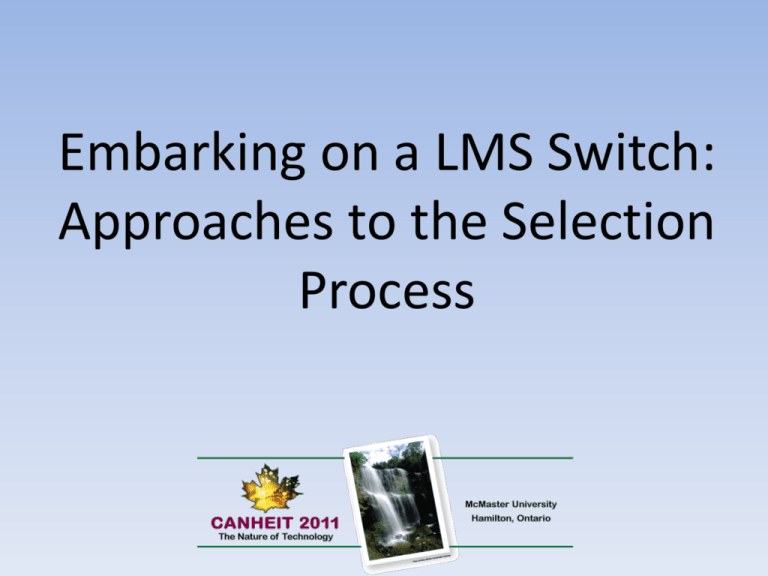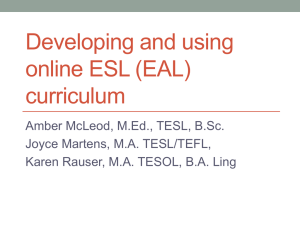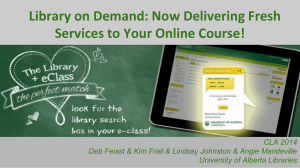Presentation Slides - McMaster University
advertisement

Embarking on a LMS Switch: Approaches to the Selection Process Panelists • University of Waterloo: Andrea Chappell – ANGEL to Desire2Learn • University of Alberta: Scott Delinger – Various Blackboard & Moodle to Moodle 2.0 • University of Lethbridge: David Hinger – Blackboard WebCT to Moodle • McGill University: Maggie Lattuca – Still in suspense uWaterloo LMS background • 28,000 students; 1300 (70%) courses in LMS • LMS history – 2000 – 2003: Homegrown pedagogical “front end” • Initially Blackboard for back end tools, then ANGEL – Summer 2004 – present: ANGEL – May 2009: Blackboard buys ANGEL … project struck • Coming from a “happy place” … one LMS for campus, pretty happy with it Serendipitous Pre-project • Oct. 2008 – Apr. 2009: Online Learning Environment Review Project – Student survey (7000 responses to 5 multiple choice, 1100 responses to open question) – Faculty focus session (~30 from across spectrum) – Scan LMS landscape, Web 2.0/social, cloud, etc. • Concluded: Better “live”, math, audio/video (extensible), and mobile … but keep ANGEL Overview of selection process • • • • • • Specifications: Fall 2009 – March 2010 RFI: May 2010 RFP: Aug. 2010 Evaluate RFP, Open Source: Sep. – Dec. 2010 Recommendation to university IT: Feb. 2011 Award to Desire2Learn: early March 2011 Preparing for Process – Tips • Understand your campus LMS culture – Still want/need an LMS? – Want out-of-box or demand lots of change? – Do you know you want Open Source? • Is the project team complete? – Core team: IT & pedagogical support, distance ed, Library, “the faculty”, “the students” – Resource: Bookstore, Analytics, Emerging tech Input from constituents – Tips • Focus requested input, but also leave opportunity for open comment. • Student survey inquired about mobile access, communication tools, learning experience, + open question. • Instructor focus groups were asked, What works, what doesn’t, what you’d like to see? RFI/RFP Specifications – Tips • Focus less on basic, more on your scenarios • Functionality – we divided into 4 sections: – Basic (expected in all LMSs) – respondents confirm or explain deviations – less work! – Specialized (beyond Basic, and on which we rely); e.g., teams, repositories, automation – Integration and extension capabilities – Desirable (e.g., math, a/v communications, ePortfolio, mobile strategies, content mgmt) RFI – Tips • Why do you want one? We used it to: – “Beat the bushes” (Who will respond) – Test specs (Got answers we wanted?) – Ask open-source specific questions. • Received 9 responses (but, only 4 to RFP!) • Do it again? Not so sure. – Helped get the RFP right. – But, longer process, maybe lost RFP respondents. RFP – Tips • If plan to include “from source” Open Source, say so in RFP (Purchasing happier). • Know how to assess RFP rating scheme – If team does all sections together, take average or mean or ? What to do with outliers? – Or, make small groups responsible for marking some sections? • Keep notes on why mark areas down in case challenged by vendors. Implementation • How aggressively do you want to move? – “Rip off the bandage” (quick move to one system) – Take time for thoughtful change (e.g., for greater consistency and to take advantage of new system) • Start with “robust” instructors who can deal with change and challenges • Be ready to accept new ways of doing things – Opportunities may present themselves! UAlberta LMS background • 37,600 students; 2300 courses in LMS in fall/winter • LMS history – 1998 – 2010: WebCT – Blackboard Vista 8 • Centrally supported – 2004: AB School of Business adopts Blackboard – 2005 – 2010: Moodles pop up – 2009: LMS Review says adopt Moodle, keep Vista – Summer 2010: Evaluation of LMS options – Fall 2010: Moodle selected as next LMS Overview of selection process • Read 2009 LMS report • Summer 2010 – Arm’s-length from CIO review process – meet with University community – Eval Vista, Learn, Moodle tools in use/requested • Issue Evaluation Team report, get feedback • Oct 4, 2010: Moodle announced • Moodle 2.0 pilot run Winter Term 2011 Implementation – Tips • Timeline – ~6000 course sections by Jan 2013 • Pilot w/enthusiastic experimenters – Capture all feedback, address issues, inform training – Courses selected to represent many types – Take calculated risks • Oversight Committee • Project Team: PM, sw, hw, train, comms, owners Moving to Moodle David Hinger WebCT (Blackboard CE) • Started - September 1999 • Blackboard purchased - 2006 Options • Move to Blackboard Learn • Move to an alternative LMS Both will require the same amount of time, money and effort! LMS Transition Steering Committee Evaluation Process How do we Make the Move? Communication Strategy Moodle Meet Steve Moodle Swag Get your picture with Steve Create a Sense of Urgency It’s Here Poster Todd’s Videos How do I Move How do we design a new Moodle for the U of L? Blue Sky Ideas • Lets start from scratch - What do you want to see. • Not constrained by the limitations of the technology! LMS Design Game • • • • Design your own LMS Posterboard puzzle Tactile exercise Had to work out Navigation issues U of L Moodle Theme McGill Background • • • • • • • 36,531 students 1,627 tenured and tenure-stream faculty 11 faculties and 10 schools WebCT since 1998 WebCT Vista since 2005 Over 20,000 course sections 72% faculty employ the LMS Content and Collaboration Solutions - IT Services - June 8, 2011 39 User Requirements • 2009-2010 • Use Case model – 31 instructors, representing 11 faculties – 8 students, from various departments – 15 administrative staff, from 7 departments that support teaching and learning Content and Collaboration Solutions - IT Services - June 8, 2011 40 Findings • Faculty 1. Collaboration tools 2. Open content • Students 1. Collaboration tools 2. Customization of online learning environment • Staff 1. Collaboration tools 2. Open content Content and Collaboration Solutions - IT Services - June 8, 2011 41 Project Structure Executive Committee Sponsor Provost Project Team (RFI) Selection Team (RFP/CFT) Consultation Group – Pedagogy Consultation Group – Technology Content and Collaboration Solutions - IT Services - June 8, 2011 42 RFI • 2010-2011 • • • • What don’t we already know? Opportunity to evaluate open source Refine our requirements, test them Involve and hear from our community Content and Collaboration Solutions - IT Services - June 8, 2011 43 RFI • • • • 2 proprietary solutions 2 service providers for Moodle 1 service provider for Sakai – too late! Are we ready for open source? – Consulted with Canadian and American universities Content and Collaboration Solutions - IT Services - June 8, 2011 44 RFI • Full day vendor demos (x 4) – Morning dedicated to pedagogy – Afternoon dedicated to technology • Online evaluation form • Opportunity to ask questions, vendor or Educational Technologies (used back channel) • Instructor, student, staff ‘sandboxes’ • Sample courses migrated (evaluation form) Content and Collaboration Solutions - IT Services - June 8, 2011 45 What We Learned 1. Mandatory and general requirements 2. Open to hosted options 3. Definitive requirements, yes or no 4. Short overview of solutions by vendor 5. Simplified evaluation forms 6. Would we do it again? Yes! Content and Collaboration Solutions - IT Services - June 8, 2011 46 RFP/CFT • Released in May 2011 • Anticipate decision end June Content and Collaboration Solutions - IT Services - June 8, 2011 47 Implementation • 1st pilot, January 2012 • 2nd pilot, May 2012 • Go live, September 2012 Content and Collaboration Solutions - IT Services - June 8, 2011 48 For more information … • uWaterloo: andrea.chappell@uwaterloo.ca http://ist.uwaterloo.ca/projects/lms_selection • Alberta: scott.delinger@ualberta.ca http://www.moodle.ualberta.ca/ • Lethbridge: hingde@uleth.ca http://www.uleth.ca/crdc • McGill: maggie.Lattuca@mcgill.ca http://blogs.mcgill.ca/mycourses 49

